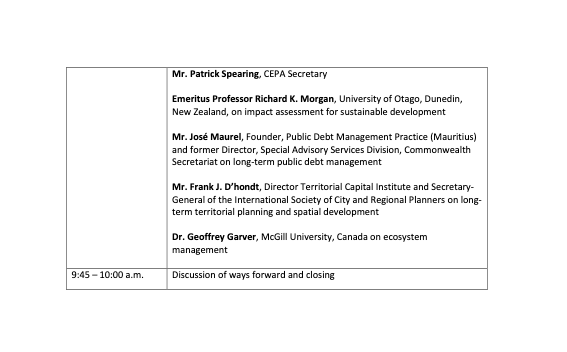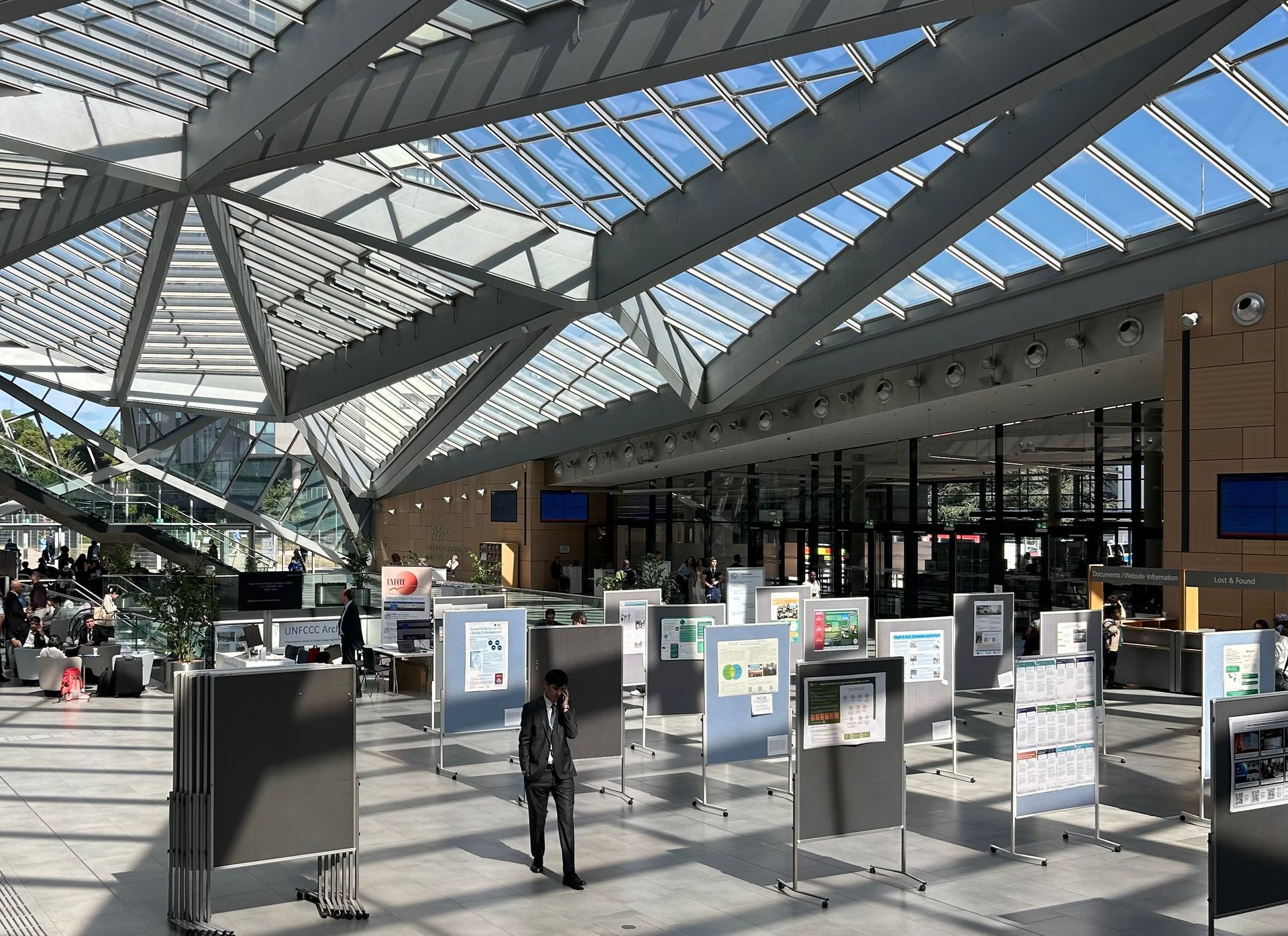Intergenerational Equity for Sustainable Development
Virtual Workshop on the Promotion of Intergenerational Equity for Sustainable Development


On 8 March the United Nations Department of Economic and Social Affairs (UN DESA) is organizing a virtual workshop on the promotion of intergenerational equity for sustainable development. The workshop forms part of a series to launch the Strategy Guidance Notes to operationalize the principles of effective governance for sustainable development which were developed by the Committee of Experts on Public Administration (CEPA) and endorsed by the Economic and Social Council. One of the principles is on intergenerational equity to ensure inclusiveness. The 2030 Agenda for Sustainable Development and the principle of intergenerational equity requires countries to be engaged with and aware of the various dimensions of impact assessment, long-term public debt management, long-term territorial planning and spatial development and ecosystem management. The virtual workshop will discuss these strategies for pursuing intergenerational equity and will attempt to share knowledge, raise awareness and provide a platform to connect participants with partners in other countries, the UN system and other organizations to take further concrete action-oriented activities.
Concept note for the workshop
Background
The Committee of Experts on Public Administration (CEPA) adopted 11 principles of effective governance at its seventeenth session. The principles, endorsed by the Economic and Social Council in its resolution 2018/12, highlight the need for pragmatic and ongoing improvements in national and local governance capabilities to achieve the Sustainable Development Goals. The principles are designed to ensure effective, accountable and inclusive government.
CEPA has developed a wide range of commonly used strategies for operationalization of the principles. One of the principles is on intergenerational equity to ensure inclusiveness. To promote prosperity and quality of life for all, institutions should construct administrative acts that balance the short-term needs of today’s generation with the longer-term needs of future generations. The strategies for intergenerational equity are (i) impact assessment; (ii) long-term public debt management; (iii) long-term territorial planning and spatial development; and
ecosystem management.
Ensuring the full success of laws, policies and strategies which balance long- and short- term needs remain a challenge in many countries. The profligacy of living generations severely limits the options for future generations, and short-term calculations continue to dominate policymaking. Accounting for the interests of future generations requires strengthening capacities to understand and assess the future, building long-term thinking into important
policies and decision-making, and ensuring that interests of future generations at all levels of governance are integrated into institutions. The 2030 Agenda and the principle of intergenerational equity requires countries to be engaged with and aware of the various dimensions of impact assessment, long-term public debt management, long-term territorial planning and spatial development and ecosystem management.
The Department of Economic and Social Affairs through its Division for Public Institutions and Digital Government (DESA/DPIDG) has engaged experts to prepare guidance notes and provide content to the four strategies designed to give effect to the principle of intergenerational equity. One of these notes is the above mentioned CEPA strategy guidance note on long-term territorial planning and spatial development.
The notes were crafted in global consultation with other specialized experts in the field. The notes include information on how Governments can both assess the current status and measure progress to ensure that governance systems address long-term challenges. The notes outline the strategies, assess the extent to which they are being or have been adopted in other countries, and highlight the methods of implementation, opportunities to engage in peer-to-peer learning and research, and pursue further international development cooperation in accordance with country needs.
The notes are available on the website at:
https://publicadministration.un.org/en/Intergovernmental-Support/CEPA/Principles-of-
Effective-Governance
Virtual facilitated workshop
Using the completed notes as a main point of reference, DESA/DPIDG plans to hold an online facilitated workshop on 8 March 2022. The workshop will attempt to share knowledge, raise awareness and provide a platform to connect participants with partners in other countries, the UN system and other organizations to take further concrete action-oriented activities on intergenerational equity. The workshop will:
(i) provide a platform to share knowledge and guidance on how to promote inclusiveness
and intergenerational equity for sustainable development;
(ii) increase understanding and awareness of the competencies and skills needed to apply
the principle of intergenerational equity with an emphasis on institutions at all levels;
(iii) link participants with peer- to- peer learning opportunities and research networks in
specific practice areas; and
(iv) identify action-oriented and concrete activities and capacity building initiatives to
enhance the principle of intergenerational equity that can be undertaken with the
support of the UN system and other organizations.
The workshop is intended to benefit policymakers in centres of Government, key line ministries,
and public administration, particularly in developing countries. Relevant United Nations
organizations, regional organizations and professional and academic communities, together with
all relevant stakeholders, are invited to attend.
The workshop will be held on 8 March 2021; (8 am to 10 am (EST) please check local time).
Workshop Registration: https://bit.ly/3HyM9KH
Programme of the workshop


Acknowledgements
The strategy guidance note was authored by Frank J. D’hondt (Director Territorial Capital Institute and Secretary-General of the International Society of City and Regional Planners). During its preparation, consultations were carried out with the following international experts: Cliff Hague (Emeritus Professor of Spatial Planning, Heriot-Watt University, Edinburgh and former President of Royal Town Planning Institute and Commonwealth Association of Planners), Elisabeth Belpaire (Vice President of ISOCARP), Juanee Cilliers (Planning Professor, University of Sydney), Ulrich Graute (member of the Scientific Committee of ISOCARP), Marco Kamiya (UNIDO), Reza Pourvaziry (Urban Economy Forum), Remy Sietchiping (UN-Habitat), Thomas George, Soumen Bagchi and Han Yang (UNICEF).
Link to the CEPA strategy guidance note
https://publicadministration.un.org/Portals/1/Strategy%20note%20territorial%20planning%20and%20spatial%20development%2010-02.pdf
Committee of Experts on Public Administration
https://publicadministration.un.org/en/CEPA
So also Ulrich's much viewed post on the first anniversary of this blog
http://ugraute.de/first-anniversary-of-the-blog
Policies and Governance for Resilient and Sustainable Cities and Regions









